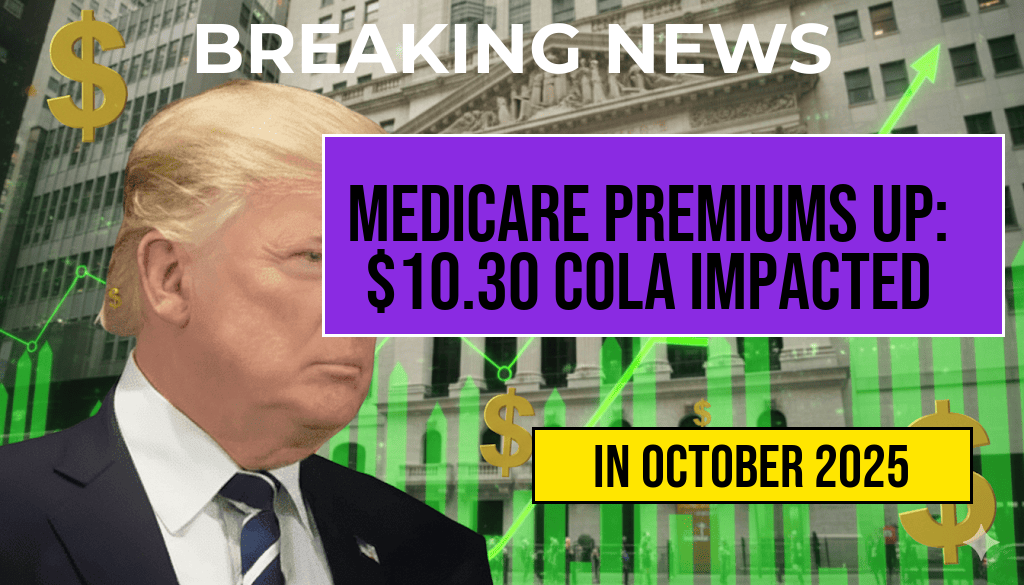The recent announcement regarding the increase in Medicare Part B premiums has raised concerns among beneficiaries, particularly in light of the anticipated Cost-of-Living Adjustment (COLA) for Social Security payments. Starting in 2024, Medicare premium costs are set to rise by $10.30 a month, which will significantly impact the net increase in beneficiaries’ Social Security checks. The adjustment is a troubling development for many seniors, who rely heavily on their monthly benefits. As inflation continues to affect the cost of living, understanding the interplay between Social Security COLA and rising healthcare costs has never been more critical.
Understanding the Medicare Part B Premium Increase
The Centers for Medicare & Medicaid Services (CMS) announced that the monthly premium for Medicare Part B will increase from $164.90 to $175.20. This adjustment represents a 6.25% rise in costs, which is notably higher than last year’s increase.
How the Premium Increase Affects Seniors
The increase in Medicare Part B premiums means that a substantial portion of the expected COLA will be consumed by rising healthcare costs. In 2024, Social Security recipients are projected to see a COLA increase of about $29, but with the new Part B premium hike, beneficiaries will effectively gain only $18.70 of that adjustment.
Breaking Down the Numbers
| Year | Projected COLA Increase | New Medicare Part B Premium | Net Gain for Beneficiaries |
|---|---|---|---|
| 2024 | $29.00 | $175.20 | $18.70 |
Reasons Behind the Increase
- Healthcare Costs: Rising healthcare expenses, driven by inflation and increased demand for medical services, contribute significantly to the premium adjustments.
- Legislative Changes: Changes in healthcare policies and funding can lead to fluctuations in Medicare costs.
- Economic Factors: Broader economic conditions, including inflation rates, influence the overall cost of living and subsequently, Medicare premiums.
The Broader Economic Context
The increase in Medicare premiums reflects a trend observed over recent years, where healthcare costs have consistently outpaced general inflation. According to the Forbes, many seniors are finding it increasingly challenging to maintain their standard of living as fixed incomes struggle to keep pace with rising costs.
What Seniors Can Do
Beneficiaries should consider various strategies to mitigate the financial impact of rising Medicare premiums. Some suggestions include:
- Reviewing Coverage Options: Seniors may explore different Medicare Advantage plans that could offer lower premiums and additional benefits.
- Utilizing Preventive Services: Taking advantage of preventive care services covered by Medicare can help reduce long-term healthcare costs.
- Budgeting Wisely: Adjusting personal budgets to account for increased healthcare costs can help manage expenses more effectively.
Future Projections
Looking ahead, analysts predict that Medicare premiums will continue to rise in the coming years, driven by ongoing inflation and the aging population. As a result, it is crucial for seniors and their families to stay informed about potential changes to Medicare and Social Security, which can significantly affect their financial well-being. For more information about Medicare and its coverage options, visit the official Medicare website.
With the continued increase in healthcare costs, it is imperative that beneficiaries remain proactive in managing their healthcare expenses. Understanding the implications of these changes can help seniors navigate the complexities of Medicare and make informed financial decisions.
Frequently Asked Questions
What is the reason for the increase in Medicare Part B premiums?
The increase in Medicare Part B premiums is primarily due to rising healthcare costs and the need to ensure that the program remains financially sustainable. This year, the premiums are expected to rise significantly, impacting beneficiaries’ budgets.
How much will the Medicare Part B premium increase?
The Medicare Part B premium will see an increase of $10.30 per month, which is a notable rise compared to previous years. This change directly affects the amount beneficiaries pay for their health coverage.
How does the COLA affect Medicare premiums?
The Cost-of-Living Adjustment (COLA) is designed to help beneficiaries keep up with inflation, but in this case, a significant portion of the COLA increase will be consumed by the rising Part B costs, leaving less for recipients to spend on other necessities.
What should beneficiaries do if they are concerned about rising costs?
Beneficiaries who are concerned about rising costs should review their Medicare plans and explore options such as supplemental insurance or alternative plans that may offer more affordable coverage, as well as seek assistance from financial advisors if needed.
When will the new Medicare premiums take effect?
The new Medicare Part B premiums will take effect at the start of the next calendar year, typically on January 1st, allowing beneficiaries to prepare for the changes in their monthly expenses.

Leave a Reply